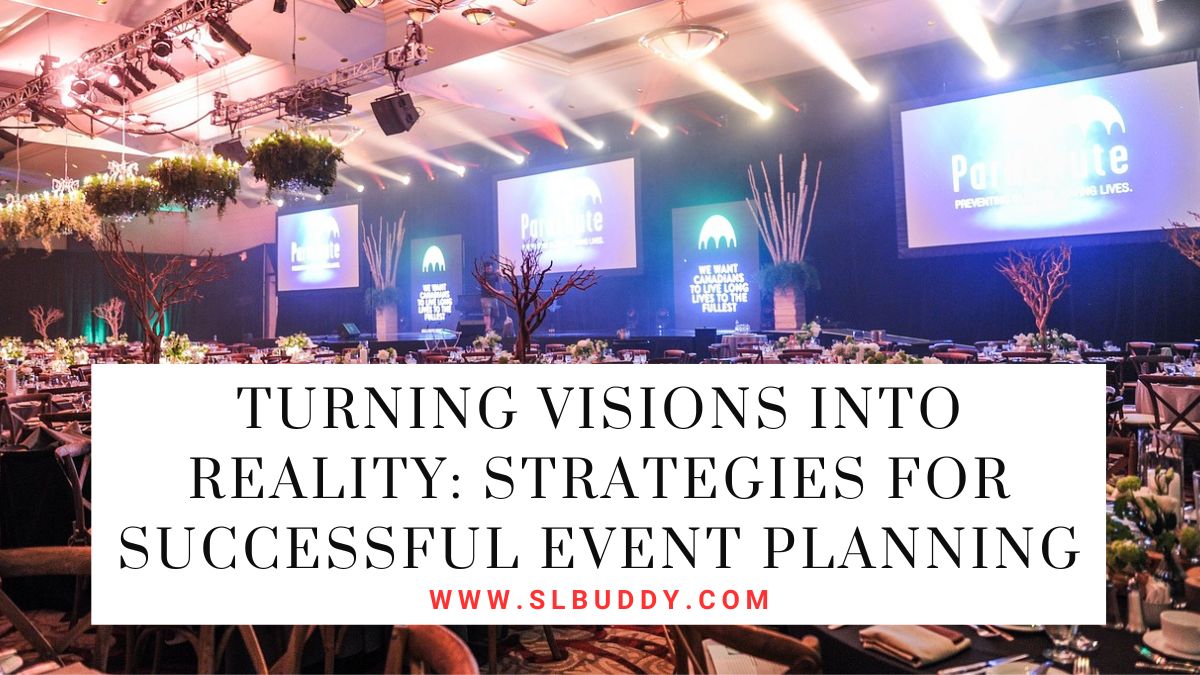
Events serve as powerful platforms for communication, fostering connections, and facilitating the exchange of ideas.
They transform abstract concepts into immersive experiences, bringing people together for a shared purpose.
Whether it’s a corporate conference, a music festival, or a community fundraiser, each event uniquely manifests a vision brought to life through meticulous planning and execution.
This guide aims to provide strategies and insights that will aid you in turning your event visions into reality, ensuring successful and unforgettable experiences for all participants.
1. Choose the Right Event App
In today’s digital age, event apps have become integral to successful events.
They simplify event management processes, enhance attendee engagement, and provide valuable data and insights.
Read this guide for the best event apps to help you achieve your goals. By carefully assessing your event’s needs and objectives, you can select the right app to leverage its features and maximize its potential.
When selecting an event app, consider your objectives, audience needs, budget, and technical requirements.
For instance, if attendee networking is a priority for your event, choose an app with robust networking features such as matchmaking and private messaging.
Similarly, if you’re organizing a large-scale event, ensure the app can handle high traffic and has reliable technical support.
2. Define Clear Objectives
Clarity in defining objectives forms the backbone of successful event planning.
This involves understanding the core purpose of the event – why are you organizing it, what do you hope to achieve, and who is your target audience?
Whether promoting a brand, raising funds, or celebrating a milestone, having well-articulated goals can guide your decision-making process, from choosing the venue to deciding on the event itinerary.
Clear objectives help you stay focused and efficient. They align your team’s efforts, ensuring everyone is on the same page.
For example, if a corporate seminar aims to educate attendees about a new product, all aspects – from speakers and topics to presentation slides and handouts – should support this objective.
Objectives also provide measurable metrics to assess the event’s impact and effectiveness.
3. Know Your Audience
Understanding your target audience is essential in delivering a successful event.
It enables you to tailor the event experience to their needs and preferences, ensuring maximum engagement and participation.
Conducting market research, analyzing attendee demographics, and gathering feedback from past events are effective ways of understanding your audience.

Moreover, knowing your audience can help you identify potential partnerships and collaborations that will enhance the event experience.
For instance, if your target audience comprises young professionals, partnering with a popular food truck or a local craft brewery can add an element of uniqueness and appeal to this demographic.
4. Create a Comprehensive Event Plan
A comprehensive event plan is a key document outlining all the necessary details and logistics to organize an event.
It serves as a roadmap for your team, providing clarity on tasks, timelines, and resources.
A well-structured event plan should cover budgeting, marketing strategies, venue arrangements, speaker recruitment, and contingency plans.
Creating an event plan can be daunting, but investing time and effort in this stage is crucial.
It will help you identify potential challenges or gaps that need addressing and ensure smooth execution on the event day.
Additionally, a comprehensive event plan can reassure stakeholders and sponsors that their investment is being used efficiently and effectively.
5. Leverage Event Technology
Event technology has revolutionized the event industry, transforming traditional events into interactive and immersive experiences.
From virtual and hybrid events to augmented reality and gamification, there are various ways to incorporate technology into your event.
Integrating event technology can enhance engagement, deliver personalized experiences, and provide valuable data for post-event analysis.
It also offers creative branding and sponsorship opportunities, making it an attractive option for stakeholders.
However, it’s essential to carefully select and test any technology before incorporating it into your event.
Technical glitches or compatibility issues can significantly impact the success of your event and leave a negative impression on attendees.
6. Hire a Professional Event Planner
Organizing an event requires significant time, effort, and attention to detail.
Hiring a professional event planner can be a wise investment if you have a busy schedule or lack experience in event planning.
They bring expertise, knowledge of the industry, and established networks that can save you time and resources in organizing your event.
Moreover, they can handle all aspects of event planning, from budgeting and vendor management to crisis management and on-site coordination.
This lets you focus on other key tasks, such as promoting the event and networking with attendees.
When selecting an event planner, ensure they have experience organizing events similar to yours, have a good track record, and share your vision for the event.
7. Promote Your Event Effectively
Effective event promotion is crucial to draw an audience and ensure the event’s success.
Use a multi-channel marketing strategy encompassing various promotional tools such as social media, email marketing, content marketing, and traditional advertising.
Tailor your message to suit each platform and your audience’s preferences.
For instance, you could use visually appealing graphics for Instagram posts, detailed articles for your blog, and concise, engaging messages for Twitter.
Leverage the power of partnerships and influencer marketing for broader reach. Collaborate with industry influencers who can help endorse your event to their followers.
Also, encourage attendees to share the event on their social media networks, offering incentives such as discounts or exclusive access to certain event features.
Remember to create a unique, memorable hashtag for your event to track engagement and encourage conversation.
8. Prioritize Attendee Experience
The success of your event ultimately depends on the attendee experience.
Everything from registration and check-in to seating arrangements and food and beverage selection can impact how attendees perceive the event.
Make sure to offer a hassle-free registration process, provide clear instructions for check-in, and ensure comfortable seating with good stage visibility.
Food and beverage choices should cater to various dietary requirements and preferences, including vegan, vegetarian, gluten-free, and halal options.
Additionally, consider incorporating interactive elements such as Q&A sessions or networking activities to keep attendees engaged and make the event more memorable.
Don’t miss: 8 Reasons Your Business Needs a Multilingual Marketing Strategy
The bottom line
To host a successful event, plan meticulously, pay attention to details, and understand your audience.
Continuously assess and improve your event strategies for a memorable and impactful experience that aligns with stakeholders’ goals.
Prioritize attendee experience, leverage technology for engagement, and deliver personalized moments. With the right approach and team, your event will be a success.










